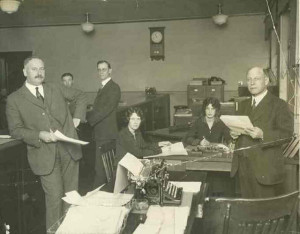Good morning,

Flickr/Metro Library and Archiv
This article from iaap talks about how to become an influential administrative professional. Read below and get tips on how to become a great leader for your team.
“Become an Influential Administrative Professional
Submitted by Melissa Mahoney on Thu, 06/05/2014 – 9:00am
The landscape of the administrative profession has evolved. Many administrative and office professionals are doing more with less and are being asked to step into supervisory roles on top of it. After personally speaking with many IAAP members about their individual role and experience within their company, it became quite clear to me that the path to becoming a successful leader as an administrative professional is commonly up to the individual to maneuver. Even with the added bonus of a supportive executive or boss, finding the right management training can be a daunting task. As an HR manager, I have access to a plethora of training tools, helpful articles, conference information and learning opportunities to share with staff of all departments and positions, but some of the most successful employees I’ve worked with through the years have taken the initiative to find knowledge on their own.
Here are three ways to start your journey to become the best leader for your team and organization on your own:
1. What’s your personality type?
Find out
here. Being aware of your personality and how it affects your work and leadership style is one of the most important steps to becoming an effective leader. Once you’ve discovered your own traits, take some time to learn about your team. Learning the personality type of each team member means you can adjust your management style to better meet their needs. Not only will your team appreciate your efforts to get to know them, but work becomes more efficient and effective when you know how each member of your team best communicates, works in different environments and the type of direction they respond to best. After you discover your personality type, visit this
personality site to learn how it applies to all aspects of your life.
2. Become an influencer.
We have all met an influencer at some point; the people that quiet the room when they speak because everyone wants to hear what they have to say. That quality translates to great leadership in an obvious way. In today’s evolving business world, leaders who learn to influence and collaborate with employees tend to build a stronger, more cohesive team. In a multi-generational work environment, promoting positive collaboration as a leader cuts down on the tension and conflict management that generally accompanies different generational view points. It takes patience to develop the skills needed to become an influencer. Influencers choose their words wisely so their message is meaningful and succinct. They earn employee trust and respect as opposed to demanding and expecting it. Employees will be much more engaged and willing to collaborate if it is a choice and not an edict from their manager. This can be an especially important philosophy for the administrative professional moving into management as the peer group you are now leading may harbor pre-conceived feelings—often negative—about one of their own now being their boss. Learning to influence instead of dictate can help alleviate conflict.
3. Turn conflict into productivity.
Conflict exists in even the most ideal and productive work environments. It’s in our very nature to disagree with each other. When conflict is managed well by leaders, it can be harnessed and used to create positive outcomes for the company. New ideas, more efficient processes and personal growth are all very positive side effects to well-managed conflict. To immediately improve your conflict management skills, become a better listener. Give the employees involved in the conflict a chance to speak. Rather than trying to solve the problem in the moment of conflict, give everyone time to gather their thoughts and information. You need time to speak with each employee involved and then give yourself some time to reflect before offering a solution. This seems simple, but it can be difficult in practice, especially if the conflict is heated and emotions are high. Employees want resolution now and can sometimes be demanding, so keeping your cool is important. If you listen well, you will often find that the true origin of the conflict is not personal—even though it may seem so—but actually work related. Find the origin and focus on fixing the actual problem. ..”







